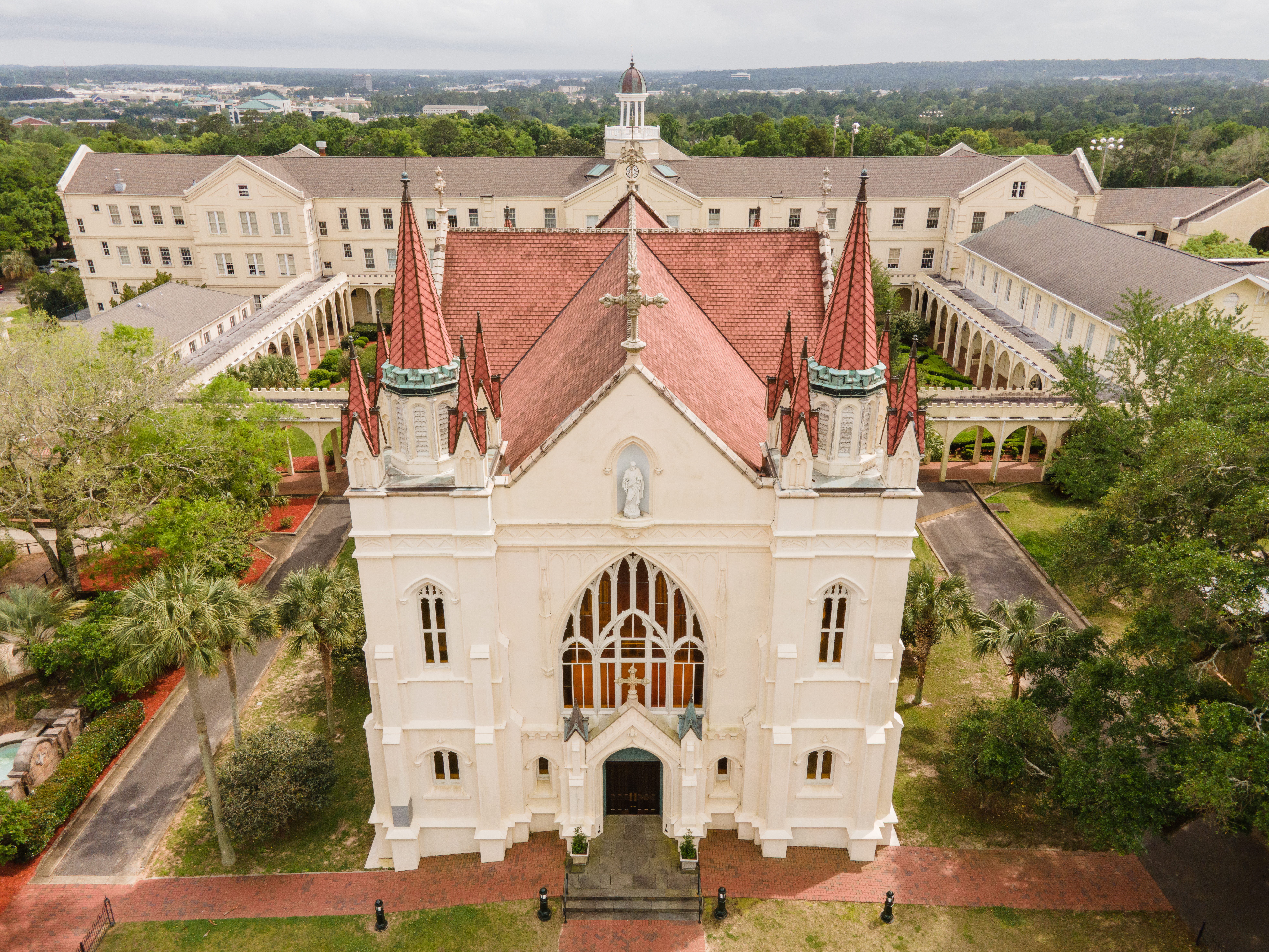
(Mobile, Ala.) Year-round we take the time to honor diverse individuals who have made historical advancements in the U.S. During March, the nation spotlights women whose impactful contributions deserve praise. Spring Hill College (SHC) dedicates this moment to reflect upon our history and recognize the women who have played a part in our growth.
“We’ve had so many incredible women who have helped build this place from the ground up,” Provost Rebecca Cantor, PhD, said, “And our leadership team has several women who come alongside folks in a strong and supportive way. It’s really incredible to see.”
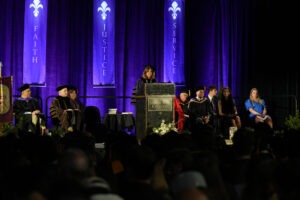
President Mary H. Van Brunt, PhD, made history as the first woman to serve in the top leadership role at SHC. During her 2023 inauguration, she vowed to be of service to the College and our centuries-old Jesuit tradition of “cura personalis,” caring for the whole person — mind, body and spirit.
“We, at Spring Hill, are so very grateful to the women who came before us. We thank them for the many paths they have made possible for us to explore. In remembering the remarkable women of our past, it is our duty to honor their sacrifices by continuing the work they started,” stated Van Brunt.
Early ideals of the Catholic church did not view women as it does today, so their roles were strictly traditional. While women served in some areas of Jesuit faith, they were absent from the field of education for many years. By the 1930s, Catholic leaders contended the Jesuits could reach the masses if their mission transcended gender.
After pushback from the Jesuit Father General in Rome, eventually SHC was authorized to launch an experimental program extension in 1932. The extension allowed women to enroll as as full-time students for the first time and allowed all adults to take Saturday classes at the College.
Marie Fidelis Yeend and Genevieve Cordilia Jarvis were the first two women to graduate from SHC at a special commencement in 1937 as part of the extended program. Although the College admitted them to take courses, campus life was vapid for women. In the 1950s, Bishop Thomas J. Toolen appealed for women’s acceptance at The Hill, wanting to fully transform SHC into a coeducational institute.
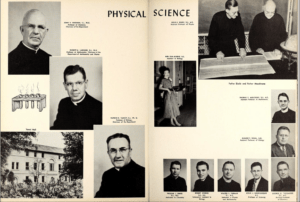
On Sep. 19, 1952, the first full-time co-eds arrived to SHC. Later that year, Helen “Muscat” Robinson was the first woman who achieved election to the student council. In 1953, Spring Hill hired Ella Morris as a special lecturer in biology — the first full-time female faculty member. In that same year, the first traditional undergraduate woman, Betty Jo Stringer, earned a BS in biology. Forty co-eds were accepted in 1952, and 28 earned a degree.
SHC may have made space for women to be in the classrooms, but there was much more needed to improve upon the overall female experience. Co-ed housing did not exist then, so students had to rent out rooms at private homes on Old Shell Road. The College purchased houses on that road in 1958 for co-ed living. They named the first home Madonna Della Strada and the second St. Margaret’s.
As more women entered SHC, extracurricular collegiate activities were scarce. The school’s attempts at being coeducational did not translate throughout the whole campus. Yet, the Badger women of The Hill sought more and found different avenues for involvement.
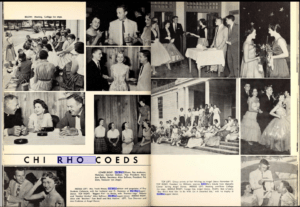
According to the Spring Hill College Archives, “They [women] were active in the Sodality of the Blessed Virgin, but in a sodality for day students. They made their closed retreat (for ladies only) at a facility off-campus. But they served as sponsors for the R.O.T.C., donned uniforms and drilled with their companies. They were very active in drama, taking part in an original musical, Last Chance, Tennessee Williams’ The Glass Menagerie, and a passion play… In 1954, an organization, Chi Rho, was formed. All coeds were automatically members, and it was considered a social and service organization. Mary Frances Gideon was the charter president.”
Initially, a club, Chi Rho was the College’s first sorority — where co-eds acted as the liaison between women, students, and faculty. They sponsored events such as the Angel Dance, Spring Dance, Victory Dance, Powder Puff game and a fashion show. In 1961, Chi Rho was split into four divisions: Alpha Chi Rho, Beta Chi Rho, Gamma Chi Rho and Delta Chi Rho. Its club system changed when the Inter Sorority Council (ISC) formed. Four new organizations replaced previous chapters: Alpha became Alpha Epsilon Sigma, Beta became Sigma Beta Phi, Gamma became Tri-Gamma and Delta became Delta Phi Delta. All still stand, besides Alpha Epsilon Sigma.
Spring Hill organized intramural programs for women between 1972 and 1973. They put together the first intercollegiate basketball team in 1973-74.
Seeking academic value outside the classroom, women forged opportunities for themselves to feel like they were a part of SHC. The collective male reception to having them on campus was slowly shifting, but biases still plagued the minds of some. However, it never deterred them from paving the way for future Badger women of The Hill.
“Women have been an integral part in the history of the college. I don’t think we would have made the strides in terms of civil and other rights, if it had not been for enrolling women. If it had not been for the women opening those doors, we would not have been prepared for Black students to come,” Director of Alumni, Parent and Community Relations Tyloria Crenshaw (1985 alumna) commented. She believes Spring Hill’s integration of women set the foundation for the College’s civil rights legacy.
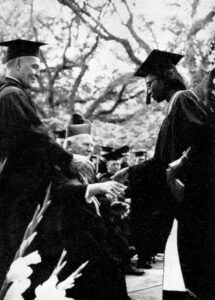
SHC welcomed in nine African American students, becoming the first school to desegregate in Alabama in 1954. Fannie Motley graduated from SHC in 1956, becoming the first African American to graduate from a four-year college in Alabama.
In 1974, an ad hoc committee was called to study the role of women at SHC. The committee found the College was still a “man’s school” with women in attendance. SHC had to restructure its academic model to foster equality and inclusion among students, faculty and staff. Fifty years later, The Hill is home to a vast community of people who come from all over the world with one goal in mind — to seek more.
Fast forward to 2024, women currently make up the highest student demographic at SHC. Including both undergraduates and graduates, the student population is 55% women and 44% men.
Director of Campus Ministry Colleen Lee (2006 alumna) has immense gratitude for the women who walked before her and she recognizes the responsibility she must undertake to move the bar forward. When Lee studied at SHC, she sought mentorship from the former director of Campus Ministry, Maureen Bergan, who showed her vocational opportunities in ministry. As a woman in a leadership position in the Catholic Church, Spring Hill has given Lee a place where she can share the experience of women with the faith community.
Bergan started the International Service Immersion Program (ISIP) in 2004. Through this program, hundreds of students participate in service learning in Central America, the Caribbean, and South America.
“There have been many women that have poured their gifts and talents into Spring Hill. They are a part of the roots of our institution — that know the history and tradition because it is interwoven into their own story,” expressed Lee.
Lee and other female faculty and staff hope to carry on the torch to create more pathways for women leadership in Jesuit education. Just like the women who nurtured their talents, they aspire to do the same as mentors for future generations.
“I think I can now be an influence for good, for change and empowerment for women like me that are stepping into roles that at one point they wouldn’t have imagined but now feel expected in some ways. Of course there would be a woman president, of course there would be a woman who is a provost,” Cantor vocalized.

She is proud of the grants Spring Hill has received to aid in areas, like the renovation of historic buildings, and the increased student support services in academic and student affairs. Cantor believes in the College’s mission to develop leaders and serve others. Twice Jesuit-educated, it was always her dream to be the provost of a small liberal arts Jesuit college, and now that’s come true, she is putting in the work.
The Badger women of today are more empowered than ever through academic and career advancement. Much of Spring Hill’s pride comes from community, which has grown immensely since women entered.
Crenshaw, one of a few Black students from her graduating class of 1985, has extensive knowledge of life as a Badger. She adores being of service to a community she, too, is a part of, and takes pride in her role to bridge connections and drive engagement among alumni and parents. Crenshaw says some look at The Hill as though it is still an exclusive institution for a specific class of people. But she works to change that perception in sharing the College’s history and her personal Badger journey.
Continuing to improve campus culture and community, SHC has entrusted Vannee Cao-Nguyen, PhD, with the development of a long-term diversity and inclusion plan. Associate Vice President for Culture and Community and Chief Diversity Officer Cao-Nguyen strives to cultivate a more diverse, equitable and inclusive climate on campus that encourages students to seek their full potential as servant leaders. “When it comes to leadership, leaders need to represent the people they serve. And, as a female in a leadership role — I think it’s important to provide support, mentorship and be a role model to help our students and young professionals understand that it is possible for them to serve in a leadership capacity here at SHC and beyond.”
Spring Hill gives honor to the extraordinary Badger women of The Hill and thanks them for their invaluable contributions. The climb they endured to make it on top The Hill is a testament to their devotion to shaping a better future for every last one of us. To the present and future Badger women of The Hill, we know you will continue to do us proud.
ABOUT SPRING HILL COLLEGE:
Founded in 1830, Spring Hill College is the oldest Catholic college in the Southeast and the third oldest Jesuit college in the United States. Spring Hill combines the Jesuit tradition of excellence in education and a commitment to caring for the whole person — mind, body and spirit — with innovative educational experiences. Located in Mobile, Ala., Spring Hill’s mission is to form leaders engaged in learning, faith, justice, and service for life. As a result, Spring Hill students are engaged, inspired and transformed by their experiences.
